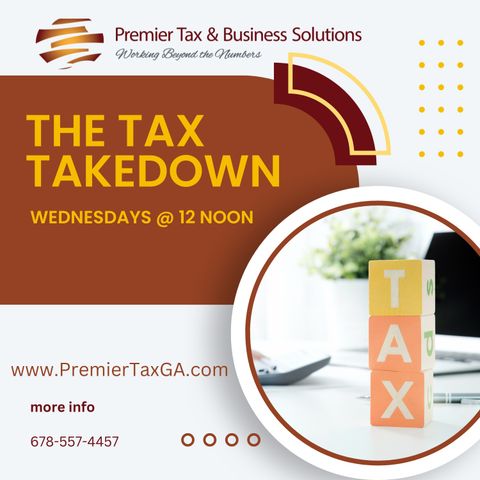Sales Tax Compliance for Small Businesses

Scarica e ascolta ovunque
Scarica i tuoi episodi preferiti e goditi l'ascolto, ovunque tu sia! Iscriviti o accedi ora per ascoltare offline.
Sales Tax Compliance for Small Businesses
Questa è una trascrizione generata automaticamente. Si prega di notare che non è garantita la completa accuratezza.
Descrizione
www.PremierTaxGA.com Hello, tax enthusiasts! Welcome back to another episode of Tax Takedown, the show where we break down complex tax topics into bitesize, digestible pieces for small business owners like...
mostra di piùAlright, let's talk sales tax compliance. I know, I know—it might not be the most exciting topic, but trust me, it's absolutely crucial for your business's financial health. So, grab your coffee and let's break it down.
First off, what is sales tax? Well, sales tax is a percentage added to the price of goods or services that's collected by the government. And here's the kicker: it's not uniform across the country. Each state and even local jurisdiction can have different rates and regulations. So, as a small business owner, you've got to keep track of where you're selling and what rates apply. Now, let's get into the nitty-gritty of compliance.
The first step is figuring out if you even need to collect and remit sales tax. And spoiler alert: in most cases, you probably do. If you have a physical presence, like a store or an office, in a state, you're usually on the hook for collecting sales tax from customers in that state.
But with the rise of e-commerce, it's not just about physical presence anymore. Many states have introduced economic nexus laws. This means that if you reach a certain level of sales or transactions in a state, even if you don't have a physical presence there, you might still need to collect sales tax. So, it's crucial to stay informed about the thresholds in each state you do business in.
Now, let's chat about collecting sales tax. Once you've determined where you need to collect, you'll need to make sure your sales transactions are properly documented. This usually means having a point-of-sale system that can calculate and add the appropriate sales tax to each sale. Remember, accuracy is key here. You don't want to overcharge or undercharge your customers—both can lead to headaches down the line. Alright, we've tackled collecting, but what's next? Remittance. You've collected sales tax from your customers, and now you need to pass it along to the government. But hold your horses, my friend. Different states have different filing frequencies—some monthly, some quarterly, and even annually. Missing a deadline can result in penalties, so make sure you have a system in place to keep track of these due dates. And hey, if dealing with all this sounds overwhelming, don't worry.
There are software solutions out there that can help you automate the process, from calculating the right tax to filing the returns on time. It's like having a virtual tax assistant at your fingertips!
Let's wrap this up with a golden nugget of wisdom: Keep detailed records. Sales transactions, tax collected, dates, and all the documentation you used to determine your tax obligations—store them safely. In case of an audit (yes, audits happen), having these records at your fingertips can save you time, money, and a whole lot of stress. And there you have it, folks—sales tax compliance demystified.
Remember, staying on top of your sales tax obligations is not only a legal requirement, but it also helps you avoid potential financial setbacks.
As we close out today's episode, I want to leave you with this thought: taxes might not be the most exciting part of running a business, but they're a vital piece of the puzzle. Keep learning, keep growing, and keep those receipts!
Thank you for tuning in to another episode of Tax Takedown. I'm Carla Nash, your tax tour guide. Until next time, stay compliant and keep building those dreams!
Informazioni
| Autore | Noise Podcast Network |
| Organizzazione | Noise Podcast Network |
| Sito | www.PremierTaxGA.com |
| Tag |
Copyright 2024 - Spreaker Inc. an iHeartMedia Company
